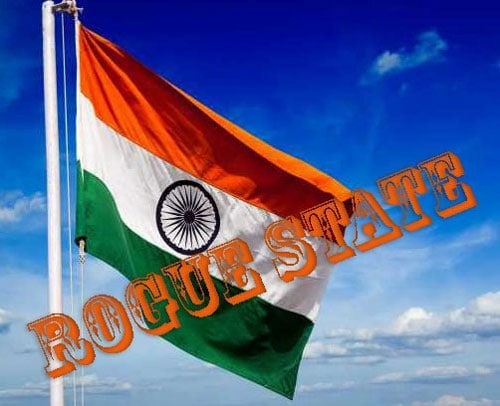Islamabad
India fits the true definition of a ‘rogue state’ for carrying out terrorist activities inside Pakistan and violating international laws, thus hampering the peace of the region.
The situation provides several options available for Pakistan to invoke the jurisdiction of platforms like the United Nations General Assembly and UN Security Council to challenge India’s violations of international norms and laws. The experts believe that Pakistan is on a strong legal footing to invoke jurisdiction of several platforms in view of India’s rogue policies and violations of international norms.
At the UN General Assembly, Pakistan can invoke Article 3 (1&2) and Article 4 under the 1936 International Convention on use of Broadcasting in the Cause of Peace, while it can make a plea on the basis of Article 33 on India’s violations of the Vienna Convention on The Law of Treaties, 1969.
Pakistan can Invoke Articles 1,35,37 and 40 through UNSC and UNGA under International Law Commission’s Articles on The Responsibilities of States for International Wrongful Acts (ARSIWA). Also, it can invoke Article II(1) under the 1953 Convention on the International Right of Correction.
Other options available for Pakistan are engagement with European Union Council to seek actions against India.
In the wake of EU DisInfo Lab revelations, Pakistan can seek investigations through political-diplomatic engagements and find out the jurisdictions from where Fake News Networks are operating. Under the International Alliance for Defence of Rights and Freedom, Pakistan has an option of pleading for the screening of Human Rights organizations and inquiry through the UN Human Rights Commission.
India’s training, harbouring, and launching of terrorist groups against Pakistan has been exposed before the world. Since 2001, Pakistan has faced more than 19,000 terrorist attacks, suffered 83,000 casualties, and faced a direct loss of more than $US 126 billion.
As per the Dossier on Indian terrorism released by Pakistan, Indian established 87 training camps including 66 set up in Afghanistan and 21 on its own soil.
ALSO READ President urges world to learn from Pak-China friendship for peace, cooperation The intelligence finding revealed that India was a strong patron and sponsor of Tehreek-e-Taliban Pakistan (TTP) and also exercised control over its splinter groups.
India has also been found violating international law, particularly United Nations Security Council resolution 1372 (2001) by financing and strengthening TTP.
Last August, India’s Research and Analysis Wing (RAW) facilitated the merger of Jamat-ul-Ahrar and Hizb-ul-Ahrar as both factions had a strong presence in Kunar and Nangarhar provinces of Afghanistan. Both terrorist organizations are banned by Pakistan. During the 80s, RAW supported Liberation Tamil Tigers Ealam to fight against the Sri Lankan government and in the late 60s Mukti Bahini in East Pakistan.
In recent times, Baloch Liberation Army and TTP are the products of RAW launched to destabilize Pakistan. India’s involvement in Balochistan has been recognized by independent sources as well. In this regard, the statement by US Special Representative James Dobbins and leaked diplomatic cables of British (2008) and UAE (2009) confirm the facts. The arrest of Indian Naval Commander Kulbhushan Jadhav as a spy conducting terrorist activities is a known fact.
Also, the threats to Pakistan made by Indian National Security Adviser Ajit Doval are a violation of Article 2(4) of the UN Charter, the UNGA Declaration on Principles of International Law Friendly Relations and Cooperation Among States in Accordance with Charter of the UN, the UNGA Declaration on the Inadmissibility of Intervention in Domestic Affairs of States and Protection of Independence and Sovereignty.
The use of Havala money – underground illegal money transactions, to sub-nationalist groups have also supported the proofs against India for its active involvement in terrorist activities.As per US Treasury Department’s study, India is one of the largest countries to move money secretly through Hawala worldwide.
ALSO READ President urges world to learn from Pak-China friendship for peace, cooperation
India is categorized by the U.S. State Department as “Jurisdiction of Primary Concern” in respect of money-laundering and financial crimes.
The U.S. State Department’s 2020 report states that for the Indian government, the money-laundering and terror financing are lower priorities while appreciating the current Pakistan government to have taken measures to address the gaps. As per essential measures of the Financial Action Task Force (FATF), India has failed to identify the risks and develop policies and domestic coordination to counter money-laundering. Under FATF recommendations, India is obligated to provide the “widest possible range of mutual legal assistance” to Pakistan in relation to money-laundering, associated predicate offenses, and terrorist financing investigations, prosecutions, and related proceedings.Recently, suspicious activity reports were filed by U.S. banks with U.S. WatchDog, the Financial Crimes Enforcement Network against 44 Indian banks, both state and privately owned.
India has been pursuing a long-standing strategy to deliberately attack educational institutions in Pakistan. The terrorist attacks on APS Peshawar, Agriculture University, Peshawar, and Bacha Khan University, Charsadda are few examples of Indian subversive activities.
The UN Secretary-General has enumerated attacking schools as “one of the six grave violations against children and armed conflict”.
Legal experts believe that by attacking educational institutions, India becomes a violator under Article 13 of the International Covenant on Economic, Social and Cultural Rights (ICESCR); Article 28 of UN Convention on the Rights of the Child (CRC); and the Rome Statute on the International Criminal Court (ICC) for attacks on educational buildings that are not military objectives in armed conflicts.
In clear violation of International Humanitarian Law, the occupation of educational institutions by Indian security in Indian Illegally Occupied Jammu and Kashmir (IIOJK) since 1990 continues. Also, the border areas of Azad Jammu and Kashmir schools remain closed due to heavy shelling by the Indian Army.—APP










